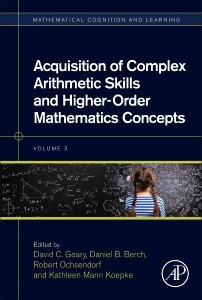Description
Acquisition of Complex Arithmetic Skills and Higher-Order Mathematics Concepts
Mathematical Cognition and Learning (Print) Series
Coordinators: Geary David C., Berch Daniel B., Ochsendorf Robert, Mann Koepke Kathleen
Language: English
Subject for Acquisition of Complex Arithmetic Skills and...:
Support: Print on demand
Description
/li>Contents
/li>Biography
/li>Comment
/li>
Acquisition of Complex Arithmetic Skills and Higher-Order Mathematics Concepts focuses on typical and atypical learning of complex arithmetic skills and higher-order math concepts. As part of the series Mathematical Cognition and Learning, this volume covers recent advances in the understanding of children?s developing competencies with whole-number arithmetic, fractions, and rational numbers. Each chapter covers these topics from multiple perspectives, including genetic disorders, cognition, instruction, and neural networks.
1. Cognitive Processes Contributing to Mathematical Performance in Children with Neurological Disorders: Implications for Typical and Atypical Mathematical Development2. Using Cognitive Science to Develop Innovative Approaches to Improving Fractions Instruction for Students with Mathematics Difficulties3. Children’s Conceptual Understanding of Multiplication and Division4. Developmental Changes in the Influences of Domain-General Capabilities and Domain-Specific Skills in Learning Algebra5. Understanding and Alleviating Children's Difficulties with Mathematical Equivalence6. Emergence of Trigonometric Abilities from Experience in Distributed Neural Networks7. Facilitating Conceptual and Procedural Learning in Algebra8. The Power of Comparison in Learning and Instruction: Experimental Evidence from Mathematics Classrooms9. The Transition from Natural to Rational Number Knowledge10. The Solving of Arithmetical Word Problems11. The Development of Competence in Complex Arithmetic12. The Solving of Algebra Problems
David C. Geary is a cognitive developmental and evolutionary psychologist at the University of Missouri. He has wide ranging interests but his primary areas of research and scholarly work are children’s mathematical cognition and learning and Darwin’s sexual selection as largely but not solely related to human sex differences.
Professor Geary directed a 10-year longitudinal study of children’s mathematical development from kindergarten to ninth grade, with a focus on identifying the core deficits underlying learning disabilities and persistent low achievement in mathematics. The study was funded by the National Institutes of Health (US), including through a MERIT award to professor Geary. One result has been the identification of the school-entry number knowledge that predicts economically-relevant mathematical competencies in adolescence. As a follow-up, professor Geary is directing a second longitudinal study, funded by the National Science Foundation (US), to identify the preschool quantitative competencies that predict this school-entry number knowledge. Professor Geary has also published conceptual and theoretical articles on individual differences in children’s mathematical learning, as well as a book published by the American Psychological Association, Children’s mathematical development (1994); recently translated into Korean. Professor Geary has also contributed to applied and policy related work on this topic, serving, for instance, on the President’s National Mathematics Advisory Panel, and chairing it’s learning processes task group.
Professor Geary’s interests in evolution are reflected in two of his other books published by the American Psychological Association, The origin of mind: Evolution of brain, cognition, and general intelligence (2005), and Male, female: The evolution of human sex differences (1998, 2010 second edition). The corresponding empirical work ranges from the study of changes in brain volume during hominid evolution t
- Covers innovative measures and recent methodological advances in mathematical thinking and learning
- Contains contributions that improve instruction and education in these domains
- Informs policy aimed at increasing the level of mathematical proficiency in the general public




